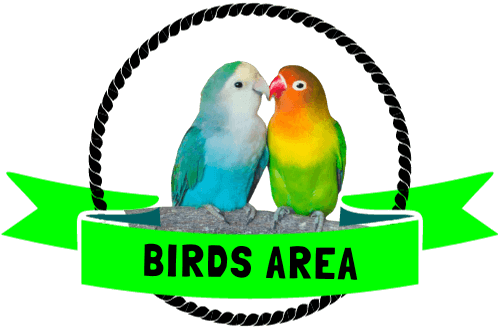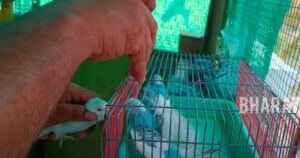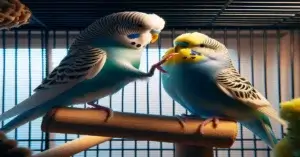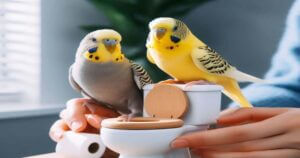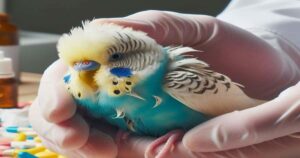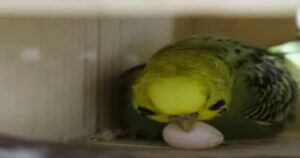Budgie Opening And Closing Beak
Budgies, also known as parakeets, are fascinating little birds with various vocalizations and behaviors. One expected behavior you may observe is your budgie opening and closing beak.
A budgie may open and close its beak for various reasons, such as regulating body temperature, clearing obstructions, displaying affection, or signaling stress. Furthermore, it could be a sign of illness or discomfort.
In this article, I explore the possible reasons for budgies opening and closing their beaks and provide insights into how to interpret this behavior.
Whether you own a budgie or want to learn more about them, keep reading to find out about this interesting behavior.
Why Do Budgies Open And Close Their Beaks?
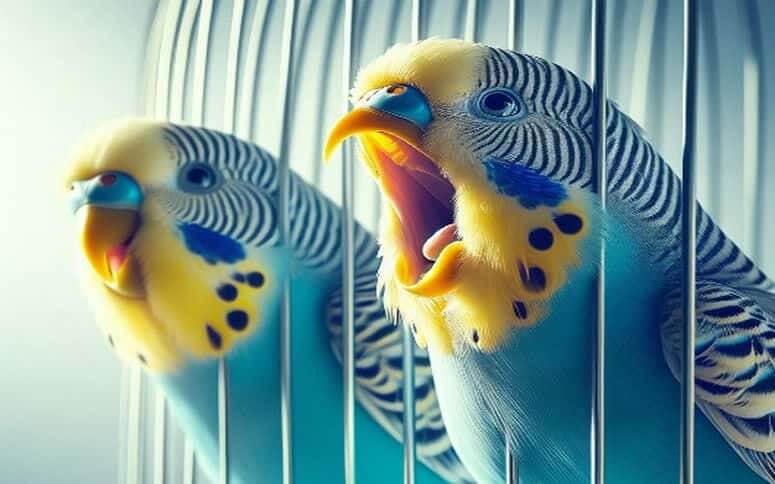
Budgies, or budgerigars or parakeets, are fascinating birds with unique behaviors. One of their intriguing behaviors is the opening and closing of their beaks. But why do they do this?
Let’s explore the reasons behind this behavior:
Natural Behaviors and Communication
Here are some natural behaviors of Budgies to open and close their beaks.
1. Normal Breathing and Cooling Mechanism
Budgies engage in the rhythmic movement of opening and closing their beaks as part of their normal breathing process. However, this action regulates their respiratory system and is a cooling mechanism, particularly in warmer environments.
2. Vocalization and Mimicking
Communication is a significant aspect of Budgie’s behavior. Opening and closing their beaks are often accompanied by vocalizations. Budgies are highly social birds that communicate through chirps and mimicry, and the beak movements play a role in this expressive behavior.
3. Expressing Contentment or Discomfort
Budgies use various body language cues to express their emotions. The opening and closing of the beak can signify contentment, especially during moments of relaxation or discomfort when they are trying to communicate unease or dissatisfaction.
Possible Health Issues
- Respiratory Problems: Abnormal beak movements may indicate respiratory issues in budgies. Labored breathing, wheezing, or irregular beak patterns can be signs of underlying problems that require prompt veterinary attention.
- Beak or Mouth Injuries: Injuries to the beak or mouth can lead to altered beak behaviors. Accidents or interactions with sharp objects may result in discomfort, causing budgies to exhibit unusual beak movements.
- Nutritional Deficiencies: A budgie’s diet is crucial to its overall health. Nutritional deficiencies can manifest in various ways, including changes in behavior, such as abnormal beak movements. Ensuring a well-balanced diet is essential for their physical well-being.
The Anatomy Of a Budgie’s Beak
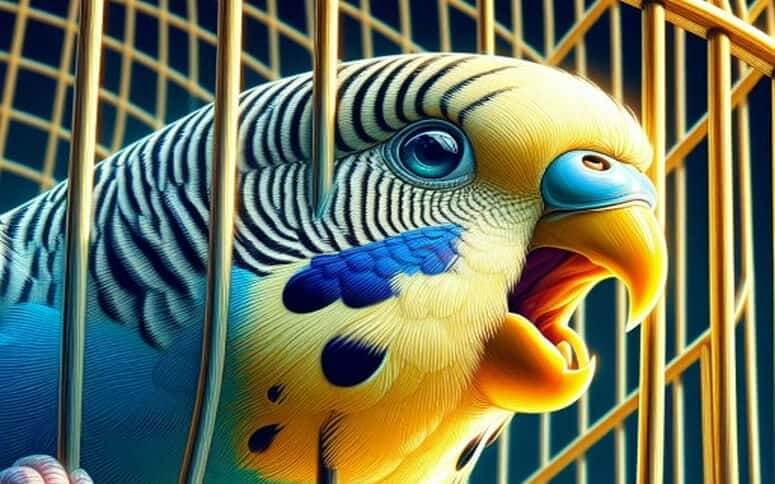
Understanding their anatomy is crucial to comprehend budgies’ beaks’ opening and closing fully. A budgie’s beak consists of the upper and lower mandibles.
The upper mandible is the top part of the beak, while the lower is the bottom. The beak is made of keratin, the same material that makes up our fingernails.
The beak serves various functions for budgies, including eating, drinking, grooming, climbing, and exploring their surroundings. It is a vital tool for their survival and overall well-being.
The beak also has sensory receptors, allowing budgies to feel and manipulate objects precisely.
Signs of Discomfort in Budgie Beak Behavior
If you notice any of the following signs in your budgie’s beak. Because it may be an indication of an unhealthy condition:
| Signs | Description | Action Required |
|---|---|---|
| Overgrown Beak | Excessively long or crooked beak affecting eating and grooming. | Consult an avian veterinarian for proper trimming. |
| Discolored Beak | Abnormal discoloration indicates potential health issues. | Seek veterinarian advice for diagnosis and treatment. |
| Flaky Or Peeling Beak | The presence of flaky or peeling skin suggests a lack of moisture or fungal infection. | Maintain a humid environment and a balanced diet. |
| Overgrown Or Misaligned Beak | Budgie struggles with normal beak functions and misalignment, causing difficulty grasping, eating, or preening. | Vet consultation for beak trimming and management. |
| Beak Injury Or Abnormalities | Traumatic injury or visible cracks, chips, or breaks require immediate veterinary attention. | Assess severity and provide appropriate treatment. |
| Behavioral Changes | Sudden behavioral shifts like excessive rubbing, aggression, or decreased appetite indicate beak discomfort. | Professional investigation of the cause is crucial. |
| Difficulty Eating | The presence of mucus or pus around the beak signals infection or respiratory problems. | Vet examination for identification and care. |
| Bleeding Or Open Sores | Signs of bleeding or open sores caused by injuries, infections, or underlying diseases. | Urgent veterinary assistance to prevent complications. |
| Excessive Beak Discharge | Presence of mucus or pus around the beak, signaling infection or respiratory problem. | Consult a veterinarian for treatment of the underlying cause. |
| Excessive Beak Wiping Or Scratching | Frequent wiping or scratching against objects due to discomfort or irritation, indicating mites, food particles, or dental issues. | Thorough examination by a veterinarian for proper treatment. |
These symptoms should prompt you to seek further evaluation by an avian veterinarian to ensure your budgie’s health and well-being.
Causes Of Abnormal Beak Behavior In Budgies
Abnormal beak behavior in budgies, such as repeatedly opening and closing, can stem from various causes. Like:
- Beak Overgrowth: Overgrown beaks can interfere with a budgie’s eating and grooming ability. This can lead to many beak-related issues, including abnormal beak behavior. Ensure that a veterinarian regularly trims your budgie’s beak to prevent overgrowth.
- Injuries: Budgies can injure their beaks due to accidents or aggressive behavior towards other birds. Injuries can cause pain and discomfort, leading to abnormal beak behavior. Immediate medical attention should be sought to address injuries and alleviate pain.
- Infection or Disease: Certain infections or diseases can affect a budgie’s beak, causing abnormalities in its behavior. Conditions such as viral infections, beak and feather disease, or mites infestation can impact the beak’s structure and function. Consult an avian veterinarian if you suspect any underlying health issues.
- Malnutrition: Inadequate nutrition can impact a budgie’s beak health, leading to abnormal behavior. A diet lacking essential nutrients like vitamin A or calcium can weaken the beak and cause abnormalities. Ensure your budgie receives a well-balanced diet of fresh vegetables, fruits, seeds, and high-quality pellets.
- Psychological Factors: Budgies are social and highly intelligent birds. Stress, boredom, or lack of mental stimulation can manifest in abnormal beak behavior. Providing ample social interaction, toys, and engaging activities can go a long way in preventing such issues.
- Genetic Predisposition: Some budgies may have genetic predispositions to beak abnormalities. Sometimes, beak deformities may occur at birth or gradually appear over time. Regular check-ups with a knowledgeable avian veterinarian can help detect and address these issues early on.
How Do You Care For A Budgie’s Beak?
Proper care is essential to ensure a healthy beak that allows your budgie to engage in these activities comfortably.
Here are some tips to help you care for your budgie’s beak:
Regular Beak Trims:
Take your budgie to an avian veterinarian for regular check-ups to safely assess and trim its beak. Avoid attempting beak trims at home, as it can be dangerous and cause injury to your budgie.
Provide Chew Toys
Provide a range of safe chew toys to promote natural beak wear. Birds like to chew on toys made of natural materials like wood or leather. Rotate toys regularly to keep your budgie entertained and prevent boredom.
Balanced Diet
Give your budgie a balanced diet with high-quality pellets, fresh fruits, vegetables, and occasional treats to promote beak health and overall well-being.
Fresh Water
Ensure that clean and fresh water is always accessible to your budgie. The moisture from drinking helps soften the food, making it easier for your budgie to eat. Change the water daily to keep it clean and prevent bacterial growth.
Grooming Assistance
Budgies frequently use their beaks to keep their feathers tidy. If a budgie experiences a beak injury or disability, they may need help with grooming. Seek guidance from your veterinarian or an avian specialist to learn how to assist your budgie in such circumstances.
Environmental Enrichment
Create a stimulating environment for your budgie to encourage natural beak behaviors. Provide climbing, perching, and playing opportunities to keep their beak active. Toys that require manipulation or shredding can help exercise the beak muscles.
Avoiding Unsafe Substances
Keep your budgie away from harmful substances that can damage their beak.
Examples include toxic materials, chemicals, sharp objects, and inadequate cage accessories. Regularly inspect the cage and surroundings for potential hazards.
Monitor Beak Health
Observe your budgie for any signs of beak abnormalities, such as discoloration, cracks, or deformities.
A professional avian veterinarian should promptly address any changes. Early detection and intervention can prevent further complications and discomfort.
Emotional Well-being
Budgies are social creatures that thrive on companionship. Spend time interacting with your budgie to promote mental and emotional well-being.
Engaging in positive interactions helps reduce stress, which indirectly contributes to overall beak health.
Tips for Preventing Beak-Related Problems In Budgies
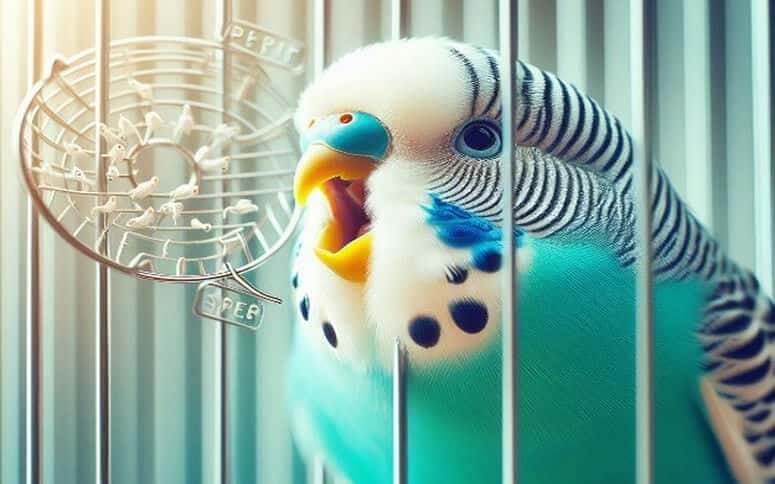
Prevention is always better than cure for beak-related problems in budgies.
Here are some tips to help you keep your budgie’s beak healthy:
- Provide a balanced diet: Ensure your budgie receives a nutritionally complete diet to support optimal beak health.
- Offer appropriate toys: Provide toys that require beak manipulation, such as wooden blocks or chewable toys, to keep the beak in good condition and prevent overgrowth.
- Regular beak trims: If your budgie’s beak tends to overgrow, consult a veterinarian who can perform regular beak trims to maintain the correct length.
- Monitor for signs of abnormal behavior: Keep an eye out for any changes in your budgie’s beak behavior, such as excessive opening or closing, and seek professional help if necessary.
Training And Behavior Modification Techniques For Budgie Beak Behavior
Training and behavior modification can effectively address specific budgie beak behavior issues. For example, suppose your budgie has developed a habit of excessive beak grinding.
In that case, you can try redirecting their attention to a more appropriate behavior, such as playing with toys or engaging in interactive activities. Positive reinforcement techniques, such as offering praise or treats, can also encourage desired behavior and discourage unwanted beak behavior.
However, it is essential to approach training and behavior modification with patience and consistency. Budgies are intelligent creatures but may take time to understand and adapt to new behaviors. Seek guidance from experienced bird trainers or avian behaviorists if needed.
When To Seek Professional Help For Budgie Beak Issues
While some beak behaviors can be managed at home, there are instances where professional help is necessary.
If you notice any signs of injury, infection, or persistent abnormal beak behavior, it is crucial to consult a veterinarian who specializes in avian care. They can provide a proper diagnosis and recommend appropriate treatment options.
Remember, early intervention is key in addressing beak issues in budgies. Delaying professional help may lead to further complications and discomfort for your feathered friend.
Frequently Asked Questions For Budgie Opening And Closing Beak
Is It Normal For A Budgie To Click Its Beak?
Should I Be Concerned If My Budgie Is Opening And Closing Its Beak Continuously?
How Can I Help My Budgie If It Is Experiencing Respiratory Problems
Can Budgies Grind Their Beaks When They Are Stressed?
Sum Up
A budgie opening and closing its beak can have various explanations. It could be a response to heat, an attempt to clear an obstruction, a sign of illness, or even a natural behavior associated with breathing.
Observing your budgie’s overall health and behavior is essential to determine the reason behind this action.
However, it’s always best to consult a veterinarian for professional advice and assistance if you have concerns.
